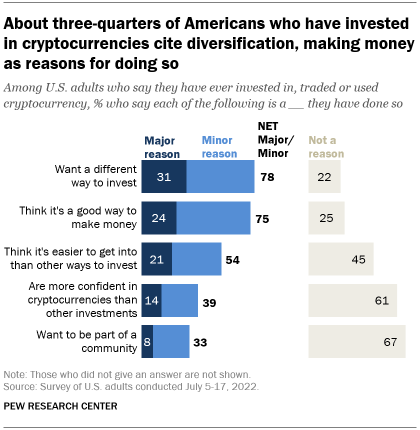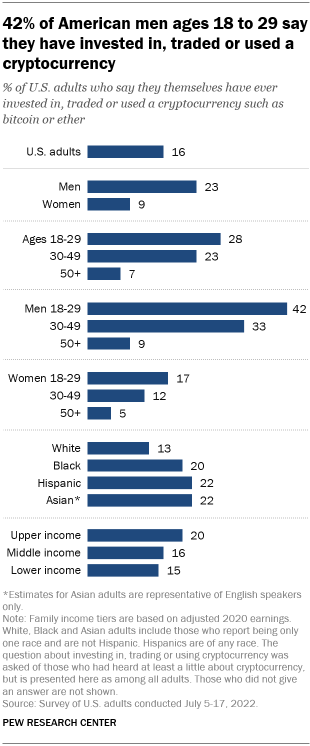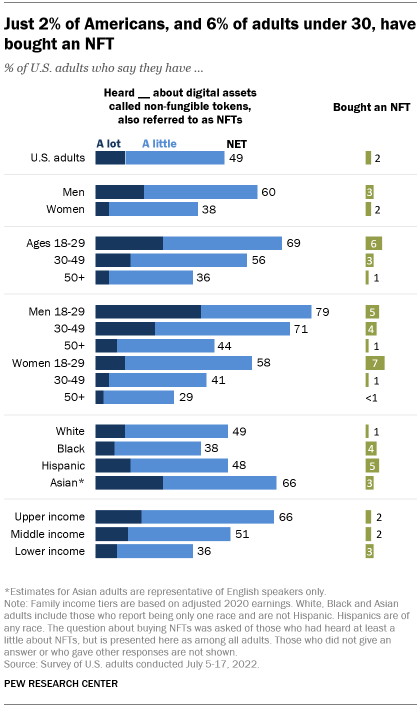The turmoil in cryptocurrency markets has taken a toll on investments. Among the 16% of U.S. adults who say they have ever invested in, traded or used a cryptocurrency such as bitcoin or ether, 46% report their investments have done worse than they expected, according to a new Pew Research Center survey.
By comparison, 15% of these Americans say their investments have done better than they expected, 31% say they have worked out about the same as they expected and another 8% say they are not sure.
The survey, which was conducted July 5-17, 2022, shows that the overall share of U.S. adults who have ever invested in, traded or used a cryptocurrency (also referred to as “crypto users” in this analysis) is unchanged since September 2021. This lack of overall change comes despite strong attention to crypto in the news.
Pew Research Center conducted this study to examine the ways technology is transforming how Americans invest and make purchases. This survey was conducted among 6,034 U.S. adults from July 5-17, 2022. This included 4,996 respondents from the Center’s American Trends Panel (ATP), an online survey panel that is recruited through national, random sampling of residential addresses. This way nearly all U.S. adults have a chance of selection. It also included an oversample of 1,038 respondents from Ipsos’ KnowledgePanel who indicated that they are lesbian, gay or bisexual (LGB), with oversampled groups weighted back to reflect proportions in the population. The survey is weighted to be representative of the U.S. adult population by gender, race, ethnicity, partisan affiliation, education and other categories. Read more about the ATP’s methodology. Here are the questions used for this analysis, along with responses, and its methodology.
This survey includes a total sample size of 234 Asian adults. The sample primarily includes English-speaking Asian Americans and, therefore, may not be representative of the overall Asian adult population. Despite this limitation, it is important to report the views of Asian Americans on the topics in this study. As always, Asian adults’ responses are incorporated into the general population figures throughout this report.
The new survey also explores the reasons people have for investing in cryptocurrencies.

Among the 16% of Americans who say they have ever invested in, traded or used a cryptocurrency, about three-quarters say that a major or minor reason is that they want a different way to invest (78%) or that it is a good way to make money (75%). Some 54% say at least a minor reason is that they think crypto is easier to get into than other ways to invest. Smaller shares cite being more confident in cryptocurrencies than other investments (39%) and wanting to be part of a community (33%) as at least a minor reason for investing.
Certain groups are particularly likely to say they have used cryptocurrencies

As the Center found in the 2021 survey, men ages 18 to 29 stand out for saying they have ever invested in, traded or used a cryptocurrency such as bitcoin or ether. About four-in-ten men ages 18 to 29 (42%) have used cryptocurrencies, compared with 17% of women in that age range.
Overall, men are 14 percentage points more likely than women to say they have used cryptocurrencies. And adults under age 50 (25%) are more likely than those 50 and older (7%) to be crypto users. There are also differences by race and ethnicity. About one-in-five Black, Hispanic or Asian Americans say they have ever invested in, traded or used a cryptocurrency, compared with 13% of White Americans who say the same.
While relatively few Americans overall say they have ever invested in, traded or used cryptocurrencies, the vast majority of Americans have heard about them. Roughly nine-in-ten Americans (88%) say they have heard at least a little about cryptocurrencies, including 26% who have heard a lot.
About half of Americans have heard about NFTs, but few have ever bought one

In addition to asking about cryptocurrencies, the survey explored general public awareness and use of non-fungible tokens (NFTs), prompted by the growing attention being paid to artists, athletes and journalists who have created and sold NFTs.
About half of U.S. adults (49%) say they have heard at least a little about non-fungible tokens, including 11% who have heard a lot. But just 2% of Americans say they have bought an NFT.
Awareness of and investment in NFTs vary by demographic factors, particularly gender and age. Men are 22 percentage points more likely than women to say they have heard of NFTs. And 69% of adults ages 18 to 29 say they have heard at least a little about NFTs, compared with 56% of those ages 30 to 49 and 36% of those 50 and older.
Differences again stand out when looking at gender and age together. For example, men under 30 are 21 points more likely than women under 30 to say they have heard at least a little about NFTs (79% vs. 58%). Notably, though, among adults under 30, men and women are about equally likely to say they have actually bought an NFT (5% vs. 7%).
The share of adults who have heard about NFTs also varies by race, ethnicity and income. Asian Americans, for example, are the most likely among racial and ethnic groups studied to say they have heard at least a little about NFTs (66%). That compares with about half of White or Hispanic adults (49% and 48%, respectively) and 38% of Black adults. Similarly, Americans with relatively higher incomes are most likely to have heard about NFTs: About two-thirds (66%) have heard at least a little, followed by roughly half of Americans in the middle income range (51%) and about a third (36%) of those with lower incomes. Small shares of all those groups have actually bought NFTs.
Note: Here are the questions used for this analysis, along with responses, and its methodology.
